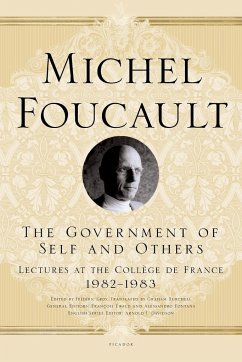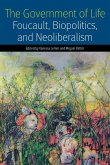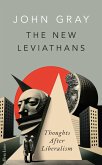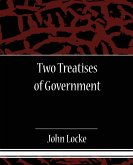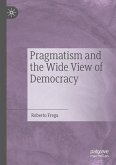Michel FoucaultLectures at the College de France, 1982-1983
Government of Self and Others
Lectures at the College de France, 1982-1983
Herausgeber: Davidson, Arnold I.
Michel FoucaultLectures at the College de France, 1982-1983
Government of Self and Others
Lectures at the College de France, 1982-1983
Herausgeber: Davidson, Arnold I.
- Broschiertes Buch
- Merkliste
- Auf die Merkliste
- Bewerten Bewerten
- Teilen
- Produkt teilen
- Produkterinnerung
- Produkterinnerung
This lecture, given by Michel Foucault at the College de France, launches an inquiry into the notion of parresia and continues his rereading of ancient philosophy. Through the study of this notion of truth-telling, of speaking out freely, Foucault re-examines Greek citizenship, showing how the courage of the truth forms the forgotten ethical basis of Athenian democracy. The figure of the philosopher king, the condemnation of writing, and Socrates' rejection of political involvement are some of the many topics of ancient philosophy revisited here.
Andere Kunden interessierten sich auch für
![The Government of Life The Government of Life]() The Government of Life33,99 €
The Government of Life33,99 €![Michel Foucault: A Research Companion Michel Foucault: A Research Companion]() Sverre RaffnsøeMichel Foucault: A Research Companion48,99 €
Sverre RaffnsøeMichel Foucault: A Research Companion48,99 €![Courage of Truth Courage of Truth]() Michel FoucaultCourage of Truth23,99 €
Michel FoucaultCourage of Truth23,99 €![The Punitive Society The Punitive Society]() Michel FoucaultThe Punitive Society63,99 €
Michel FoucaultThe Punitive Society63,99 €![The New Leviathans The New Leviathans]() John GrayThe New Leviathans23,99 €
John GrayThe New Leviathans23,99 €![Two Treatises of Government Two Treatises of Government]() John L. LockeTwo Treatises of Government23,99 €
John L. LockeTwo Treatises of Government23,99 €![Pragmatism and the Wide View of Democracy Pragmatism and the Wide View of Democracy]() Roberto FregaPragmatism and the Wide View of Democracy42,99 €
Roberto FregaPragmatism and the Wide View of Democracy42,99 €-
-
-
This lecture, given by Michel Foucault at the College de France, launches an inquiry into the notion of parresia and continues his rereading of ancient philosophy. Through the study of this notion of truth-telling, of speaking out freely, Foucault re-examines Greek citizenship, showing how the courage of the truth forms the forgotten ethical basis of Athenian democracy. The figure of the philosopher king, the condemnation of writing, and Socrates' rejection of political involvement are some of the many topics of ancient philosophy revisited here.
Hinweis: Dieser Artikel kann nur an eine deutsche Lieferadresse ausgeliefert werden.
Hinweis: Dieser Artikel kann nur an eine deutsche Lieferadresse ausgeliefert werden.
Produktdetails
- Produktdetails
- Verlag: St. Martins Press-3PL
- Seitenzahl: 432
- Erscheinungstermin: 26. April 2011
- Englisch
- Abmessung: 210mm x 140mm x 25mm
- Gewicht: 589g
- ISBN-13: 9780312572921
- ISBN-10: 0312572921
- Artikelnr.: 32727669
- Herstellerkennzeichnung
- Produktsicherheitsverantwortliche/r
- Europaallee 1
- 36244 Bad Hersfeld
- gpsr@libri.de
- Verlag: St. Martins Press-3PL
- Seitenzahl: 432
- Erscheinungstermin: 26. April 2011
- Englisch
- Abmessung: 210mm x 140mm x 25mm
- Gewicht: 589g
- ISBN-13: 9780312572921
- ISBN-10: 0312572921
- Artikelnr.: 32727669
- Herstellerkennzeichnung
- Produktsicherheitsverantwortliche/r
- Europaallee 1
- 36244 Bad Hersfeld
- gpsr@libri.de
Michel Foucault; Translated by Graham Burchell; Edited by Frédéric Gros; General Editors: François Ewald and Alessandro Fontana; English Series Editor: Arnold I. Davidson
Foreword: François Ewald and Alessandro Fontana
Translator's Note
One: 5 January 1983: First Hour
Remarks on method. - Study of Kant's text: What is Enlightenment? -
Conditions of publication: journals. - The encounter between Christian
Aufklärung and Jewish Haskala: freedom of conscience. - Philosophy and
present reality. - The question of the Revolution. - Two critical
filiations.
Two: 5 January 1983: Second Hour
The idea of tutelage ( minorité ): neither natural powerlessness nor
authoritarian deprivation of rights. - Way out from the condition of
tutelage and critical activity. - The shadow of three Critiques. - The
difficulty of emancipation: laziness and cowardice; the predicted failure
of liberators. - Motivations of the condition of tutelage: superimposition
of obedience and absence of reasoning; confusion between the private and
public use of reason. - The problematic turn at the end of Kant's text.
Three: 12 January 1983: First Hour
Reminds of method. - Definition of the subject to be studied this year. -
Parresia: difficulty in defining the notion; bibliographical reference
points. - An enduring, plural, and ambiguous notion. - Plato faced with the
tyrant of Syracuse: an exemplary scene of parresia. - The echo of Oedipus.
- Parresia versus demonstration, teaching, and discussion. - The element of
risk.
Four: 12 January 1983: Second Hour
Irreducibility of the parrhesiastic to the performative utterance: opening
up of an unspecified risk/public expression of a personal
conviction/bringing a free courage into play. - Pragmatics and dramatics of
discourse. - Classical use of the notion of parresia: democracy ( Polybius
) and citizenship ( Euripides ).
Five: 19 January 1983: First Hour
Ion in the mythology and history of Athens. - Political context of
Euripides' tragedy: the Nicias peace. - History of Ion's birth. -
Alethurgic schema of the tragedy. - The implication of the three
truth-tellings: oracle, confession ( l'aveu ), and political discourse. -
Structural comparison of Ion and Oedipus the King. - The adventures of
truth-telling in Ion: the double half-life.
Six: 19 January 1983: Second Hour
Ion: A nobody, son of nobody. -Three categories of citizen. - Consequences
of political intrusion by Ion: private hatreds and public tyranny. - In
search of a mother. - Parresia irreducible to the actual exercise of power
and to the citizen's status. - The agnostic game of truth-telling: free and
risky. - Historical context: the Cleon/Nicias debate. - Creusa's anger.
Seven: 26 January 1983: First Hour
Continuation and end of the comparison between Ion and Oedipus: the truth
does not arise from an investigation but from the clash of passions. - The
rule of illusions and passions. - The cry of confession and accusation. -
G. Dumézil's analyses of Apollo. - Dumézil's categories applied to Ion. -
Tragic modulation of the theme of the voice. - Tragic modulation of the
theme of gold.
Eight: 26 January 1983: Second Hour
Tragic modulation of the theme of fertility. - Parresia as imprecation:
public denunciation by the weak of the injustice of the powerful. -
Creusa's second confession ( aveu ): the voice of confession ( confession
). Final episodes: from murder plan to Athena's appearance.
Nine: 2 February 1983: First Hour
Reminder of the Polybius text. - Return to Ion: divine and human
veridictions. - The three forms of parresia: statutory-political; judicial;
moral. - Political parresia: its connections with democracy; its basis in
an agnostic structure. - Return to the Polybius text isegoria/parresia
relationship. Politeia and dunasteia: thinking of politics as experience. -
Parresia in Euripides: The Phoenician Women; Hippolytus; The Baccahe;
Orestes. - The Trial of Orestes.
Ten: 2 February 1983: Second Hour
The rectangle of parresia: formal condition, de facto condition, truth
condition, and moral condition. - Example of the correct functioning of
democratic parresia in Thucydides: three discourse of Pericles. - Bad
parresia in Isocrates.
Eleven: 9 February 1983: First Hour
Parresia: everyday usage; political usage. - Reminder of three exemplary
scenes: Thucydides; Isocrates; Plutarch. - Lines of evolution of parresia.
- The four great problems of ancient political philosophy: the ideal city;
the respective merits of democracy and autocracy; addressing the Prince's
soul; the philosophy/rhetoric relationship. - Study of three texts by
Plato.
Twelve: 9 February 1983: Second Hour
Plato's Letters: the context. - Study of Letter V: the phone of
constitutions; reasons for non-involvement. - Study of Letter VII. - Dion's
history. - Plato's political autobiography. - The journey to Sicily. - Why
Plato accepts: kairos; philia; ergon.
Thirteen: 16 February 1983: First Hour
Philosophical ergon. Comparison with the Alcibiades. - The reality of
philosophy: the courageous address to power. - First condition of reality:
listening, the first circle. - The philosophical oeuvre: a choice; a way;
an application. - The reality of philosophy as work of self on self (
second circle ).
Fourteen: 16 February 1983: Second Hour
The failure of Dionysius. - The platonic rejection of writing. - Mathemata
versus sunousia. - Philosophy as practice of the soul. - The philosophical
digression of Letter VII: the five elements of knowledge. - The third
circle: the circle of knowledge. - The philosopher and the legislator. -
Final remarks on contemporary interpretations of Plato.
Fifteen: 23 February 1983: First Hour
The enigmatic blandness of Plato's political advice. - The advice of
Dionysius. - The diagnosis, practice of persuasion, proposal of a regime. -
Advice to Dion's friends. - Study of Letter VIII. - Parresia underpins
political advice.
Sixteen: 23 February 1983: Second Hour
Philosophy and politics: necessary relationship but impossible coincidence.
- Cynical and Platonic game with regard to politics. - The new historical
conjuncture: thinking a new political unit beyond the city-state. - From
the public square to the Prince's soul. - The Platonic theme of the
philosopher-king.
Seventeen: 2 March 1983: First Hour
Reminders about political parresia. - Points in the evolution of political
parresia. - The major questions of ancient philosophy. - Study of a text by
Lucian. - Ontology of discourse of veridiction. - Socratic speech in
Apology. - The paradox of the political non-involvement of Socrates.
Eighteen: 2 March 1983: Second Hour
End of study of Socrates' Apology: parresia/rhetoric opposition. - Study of
the Phaedrus: general plan of the dialogue. - The conditions of good logos
. - Truth as permanent function of discourse. - Dialectic and psychagogy. -
Philosophical parresia.
Nineteen: 9 March 1983: First Hour
The historical turnaround of parresia: from the political game to the
philosophical game. - Philosophy as practice of parresia: the example of
Aristippus. - The philosophical life as manifestation of the truth. - The
permanent address to power. - The interpellation of each. - Portrait of the
Cynic in Epictetus. - Pericles and Socrates. - Modern philosophy and
courage of the truth.
Twenty: 9 March 1983: Second Hour
Study of the Gorgias. - The obligation of confession ( aveu ) in Plato: the
context of liquidation of rhetoric. - The three qualities of Callicles:
episteme; parresia; eunoia. - Agnostic game against egalitarian system. -
Socratic speech: basanos and homologia.
Course Context
Index of Names
Index of Concepts and Notions
Translator's Note
One: 5 January 1983: First Hour
Remarks on method. - Study of Kant's text: What is Enlightenment? -
Conditions of publication: journals. - The encounter between Christian
Aufklärung and Jewish Haskala: freedom of conscience. - Philosophy and
present reality. - The question of the Revolution. - Two critical
filiations.
Two: 5 January 1983: Second Hour
The idea of tutelage ( minorité ): neither natural powerlessness nor
authoritarian deprivation of rights. - Way out from the condition of
tutelage and critical activity. - The shadow of three Critiques. - The
difficulty of emancipation: laziness and cowardice; the predicted failure
of liberators. - Motivations of the condition of tutelage: superimposition
of obedience and absence of reasoning; confusion between the private and
public use of reason. - The problematic turn at the end of Kant's text.
Three: 12 January 1983: First Hour
Reminds of method. - Definition of the subject to be studied this year. -
Parresia: difficulty in defining the notion; bibliographical reference
points. - An enduring, plural, and ambiguous notion. - Plato faced with the
tyrant of Syracuse: an exemplary scene of parresia. - The echo of Oedipus.
- Parresia versus demonstration, teaching, and discussion. - The element of
risk.
Four: 12 January 1983: Second Hour
Irreducibility of the parrhesiastic to the performative utterance: opening
up of an unspecified risk/public expression of a personal
conviction/bringing a free courage into play. - Pragmatics and dramatics of
discourse. - Classical use of the notion of parresia: democracy ( Polybius
) and citizenship ( Euripides ).
Five: 19 January 1983: First Hour
Ion in the mythology and history of Athens. - Political context of
Euripides' tragedy: the Nicias peace. - History of Ion's birth. -
Alethurgic schema of the tragedy. - The implication of the three
truth-tellings: oracle, confession ( l'aveu ), and political discourse. -
Structural comparison of Ion and Oedipus the King. - The adventures of
truth-telling in Ion: the double half-life.
Six: 19 January 1983: Second Hour
Ion: A nobody, son of nobody. -Three categories of citizen. - Consequences
of political intrusion by Ion: private hatreds and public tyranny. - In
search of a mother. - Parresia irreducible to the actual exercise of power
and to the citizen's status. - The agnostic game of truth-telling: free and
risky. - Historical context: the Cleon/Nicias debate. - Creusa's anger.
Seven: 26 January 1983: First Hour
Continuation and end of the comparison between Ion and Oedipus: the truth
does not arise from an investigation but from the clash of passions. - The
rule of illusions and passions. - The cry of confession and accusation. -
G. Dumézil's analyses of Apollo. - Dumézil's categories applied to Ion. -
Tragic modulation of the theme of the voice. - Tragic modulation of the
theme of gold.
Eight: 26 January 1983: Second Hour
Tragic modulation of the theme of fertility. - Parresia as imprecation:
public denunciation by the weak of the injustice of the powerful. -
Creusa's second confession ( aveu ): the voice of confession ( confession
). Final episodes: from murder plan to Athena's appearance.
Nine: 2 February 1983: First Hour
Reminder of the Polybius text. - Return to Ion: divine and human
veridictions. - The three forms of parresia: statutory-political; judicial;
moral. - Political parresia: its connections with democracy; its basis in
an agnostic structure. - Return to the Polybius text isegoria/parresia
relationship. Politeia and dunasteia: thinking of politics as experience. -
Parresia in Euripides: The Phoenician Women; Hippolytus; The Baccahe;
Orestes. - The Trial of Orestes.
Ten: 2 February 1983: Second Hour
The rectangle of parresia: formal condition, de facto condition, truth
condition, and moral condition. - Example of the correct functioning of
democratic parresia in Thucydides: three discourse of Pericles. - Bad
parresia in Isocrates.
Eleven: 9 February 1983: First Hour
Parresia: everyday usage; political usage. - Reminder of three exemplary
scenes: Thucydides; Isocrates; Plutarch. - Lines of evolution of parresia.
- The four great problems of ancient political philosophy: the ideal city;
the respective merits of democracy and autocracy; addressing the Prince's
soul; the philosophy/rhetoric relationship. - Study of three texts by
Plato.
Twelve: 9 February 1983: Second Hour
Plato's Letters: the context. - Study of Letter V: the phone of
constitutions; reasons for non-involvement. - Study of Letter VII. - Dion's
history. - Plato's political autobiography. - The journey to Sicily. - Why
Plato accepts: kairos; philia; ergon.
Thirteen: 16 February 1983: First Hour
Philosophical ergon. Comparison with the Alcibiades. - The reality of
philosophy: the courageous address to power. - First condition of reality:
listening, the first circle. - The philosophical oeuvre: a choice; a way;
an application. - The reality of philosophy as work of self on self (
second circle ).
Fourteen: 16 February 1983: Second Hour
The failure of Dionysius. - The platonic rejection of writing. - Mathemata
versus sunousia. - Philosophy as practice of the soul. - The philosophical
digression of Letter VII: the five elements of knowledge. - The third
circle: the circle of knowledge. - The philosopher and the legislator. -
Final remarks on contemporary interpretations of Plato.
Fifteen: 23 February 1983: First Hour
The enigmatic blandness of Plato's political advice. - The advice of
Dionysius. - The diagnosis, practice of persuasion, proposal of a regime. -
Advice to Dion's friends. - Study of Letter VIII. - Parresia underpins
political advice.
Sixteen: 23 February 1983: Second Hour
Philosophy and politics: necessary relationship but impossible coincidence.
- Cynical and Platonic game with regard to politics. - The new historical
conjuncture: thinking a new political unit beyond the city-state. - From
the public square to the Prince's soul. - The Platonic theme of the
philosopher-king.
Seventeen: 2 March 1983: First Hour
Reminders about political parresia. - Points in the evolution of political
parresia. - The major questions of ancient philosophy. - Study of a text by
Lucian. - Ontology of discourse of veridiction. - Socratic speech in
Apology. - The paradox of the political non-involvement of Socrates.
Eighteen: 2 March 1983: Second Hour
End of study of Socrates' Apology: parresia/rhetoric opposition. - Study of
the Phaedrus: general plan of the dialogue. - The conditions of good logos
. - Truth as permanent function of discourse. - Dialectic and psychagogy. -
Philosophical parresia.
Nineteen: 9 March 1983: First Hour
The historical turnaround of parresia: from the political game to the
philosophical game. - Philosophy as practice of parresia: the example of
Aristippus. - The philosophical life as manifestation of the truth. - The
permanent address to power. - The interpellation of each. - Portrait of the
Cynic in Epictetus. - Pericles and Socrates. - Modern philosophy and
courage of the truth.
Twenty: 9 March 1983: Second Hour
Study of the Gorgias. - The obligation of confession ( aveu ) in Plato: the
context of liquidation of rhetoric. - The three qualities of Callicles:
episteme; parresia; eunoia. - Agnostic game against egalitarian system. -
Socratic speech: basanos and homologia.
Course Context
Index of Names
Index of Concepts and Notions
Foreword: François Ewald and Alessandro Fontana
Translator's Note
One: 5 January 1983: First Hour
Remarks on method. - Study of Kant's text: What is Enlightenment? -
Conditions of publication: journals. - The encounter between Christian
Aufklärung and Jewish Haskala: freedom of conscience. - Philosophy and
present reality. - The question of the Revolution. - Two critical
filiations.
Two: 5 January 1983: Second Hour
The idea of tutelage ( minorité ): neither natural powerlessness nor
authoritarian deprivation of rights. - Way out from the condition of
tutelage and critical activity. - The shadow of three Critiques. - The
difficulty of emancipation: laziness and cowardice; the predicted failure
of liberators. - Motivations of the condition of tutelage: superimposition
of obedience and absence of reasoning; confusion between the private and
public use of reason. - The problematic turn at the end of Kant's text.
Three: 12 January 1983: First Hour
Reminds of method. - Definition of the subject to be studied this year. -
Parresia: difficulty in defining the notion; bibliographical reference
points. - An enduring, plural, and ambiguous notion. - Plato faced with the
tyrant of Syracuse: an exemplary scene of parresia. - The echo of Oedipus.
- Parresia versus demonstration, teaching, and discussion. - The element of
risk.
Four: 12 January 1983: Second Hour
Irreducibility of the parrhesiastic to the performative utterance: opening
up of an unspecified risk/public expression of a personal
conviction/bringing a free courage into play. - Pragmatics and dramatics of
discourse. - Classical use of the notion of parresia: democracy ( Polybius
) and citizenship ( Euripides ).
Five: 19 January 1983: First Hour
Ion in the mythology and history of Athens. - Political context of
Euripides' tragedy: the Nicias peace. - History of Ion's birth. -
Alethurgic schema of the tragedy. - The implication of the three
truth-tellings: oracle, confession ( l'aveu ), and political discourse. -
Structural comparison of Ion and Oedipus the King. - The adventures of
truth-telling in Ion: the double half-life.
Six: 19 January 1983: Second Hour
Ion: A nobody, son of nobody. -Three categories of citizen. - Consequences
of political intrusion by Ion: private hatreds and public tyranny. - In
search of a mother. - Parresia irreducible to the actual exercise of power
and to the citizen's status. - The agnostic game of truth-telling: free and
risky. - Historical context: the Cleon/Nicias debate. - Creusa's anger.
Seven: 26 January 1983: First Hour
Continuation and end of the comparison between Ion and Oedipus: the truth
does not arise from an investigation but from the clash of passions. - The
rule of illusions and passions. - The cry of confession and accusation. -
G. Dumézil's analyses of Apollo. - Dumézil's categories applied to Ion. -
Tragic modulation of the theme of the voice. - Tragic modulation of the
theme of gold.
Eight: 26 January 1983: Second Hour
Tragic modulation of the theme of fertility. - Parresia as imprecation:
public denunciation by the weak of the injustice of the powerful. -
Creusa's second confession ( aveu ): the voice of confession ( confession
). Final episodes: from murder plan to Athena's appearance.
Nine: 2 February 1983: First Hour
Reminder of the Polybius text. - Return to Ion: divine and human
veridictions. - The three forms of parresia: statutory-political; judicial;
moral. - Political parresia: its connections with democracy; its basis in
an agnostic structure. - Return to the Polybius text isegoria/parresia
relationship. Politeia and dunasteia: thinking of politics as experience. -
Parresia in Euripides: The Phoenician Women; Hippolytus; The Baccahe;
Orestes. - The Trial of Orestes.
Ten: 2 February 1983: Second Hour
The rectangle of parresia: formal condition, de facto condition, truth
condition, and moral condition. - Example of the correct functioning of
democratic parresia in Thucydides: three discourse of Pericles. - Bad
parresia in Isocrates.
Eleven: 9 February 1983: First Hour
Parresia: everyday usage; political usage. - Reminder of three exemplary
scenes: Thucydides; Isocrates; Plutarch. - Lines of evolution of parresia.
- The four great problems of ancient political philosophy: the ideal city;
the respective merits of democracy and autocracy; addressing the Prince's
soul; the philosophy/rhetoric relationship. - Study of three texts by
Plato.
Twelve: 9 February 1983: Second Hour
Plato's Letters: the context. - Study of Letter V: the phone of
constitutions; reasons for non-involvement. - Study of Letter VII. - Dion's
history. - Plato's political autobiography. - The journey to Sicily. - Why
Plato accepts: kairos; philia; ergon.
Thirteen: 16 February 1983: First Hour
Philosophical ergon. Comparison with the Alcibiades. - The reality of
philosophy: the courageous address to power. - First condition of reality:
listening, the first circle. - The philosophical oeuvre: a choice; a way;
an application. - The reality of philosophy as work of self on self (
second circle ).
Fourteen: 16 February 1983: Second Hour
The failure of Dionysius. - The platonic rejection of writing. - Mathemata
versus sunousia. - Philosophy as practice of the soul. - The philosophical
digression of Letter VII: the five elements of knowledge. - The third
circle: the circle of knowledge. - The philosopher and the legislator. -
Final remarks on contemporary interpretations of Plato.
Fifteen: 23 February 1983: First Hour
The enigmatic blandness of Plato's political advice. - The advice of
Dionysius. - The diagnosis, practice of persuasion, proposal of a regime. -
Advice to Dion's friends. - Study of Letter VIII. - Parresia underpins
political advice.
Sixteen: 23 February 1983: Second Hour
Philosophy and politics: necessary relationship but impossible coincidence.
- Cynical and Platonic game with regard to politics. - The new historical
conjuncture: thinking a new political unit beyond the city-state. - From
the public square to the Prince's soul. - The Platonic theme of the
philosopher-king.
Seventeen: 2 March 1983: First Hour
Reminders about political parresia. - Points in the evolution of political
parresia. - The major questions of ancient philosophy. - Study of a text by
Lucian. - Ontology of discourse of veridiction. - Socratic speech in
Apology. - The paradox of the political non-involvement of Socrates.
Eighteen: 2 March 1983: Second Hour
End of study of Socrates' Apology: parresia/rhetoric opposition. - Study of
the Phaedrus: general plan of the dialogue. - The conditions of good logos
. - Truth as permanent function of discourse. - Dialectic and psychagogy. -
Philosophical parresia.
Nineteen: 9 March 1983: First Hour
The historical turnaround of parresia: from the political game to the
philosophical game. - Philosophy as practice of parresia: the example of
Aristippus. - The philosophical life as manifestation of the truth. - The
permanent address to power. - The interpellation of each. - Portrait of the
Cynic in Epictetus. - Pericles and Socrates. - Modern philosophy and
courage of the truth.
Twenty: 9 March 1983: Second Hour
Study of the Gorgias. - The obligation of confession ( aveu ) in Plato: the
context of liquidation of rhetoric. - The three qualities of Callicles:
episteme; parresia; eunoia. - Agnostic game against egalitarian system. -
Socratic speech: basanos and homologia.
Course Context
Index of Names
Index of Concepts and Notions
Translator's Note
One: 5 January 1983: First Hour
Remarks on method. - Study of Kant's text: What is Enlightenment? -
Conditions of publication: journals. - The encounter between Christian
Aufklärung and Jewish Haskala: freedom of conscience. - Philosophy and
present reality. - The question of the Revolution. - Two critical
filiations.
Two: 5 January 1983: Second Hour
The idea of tutelage ( minorité ): neither natural powerlessness nor
authoritarian deprivation of rights. - Way out from the condition of
tutelage and critical activity. - The shadow of three Critiques. - The
difficulty of emancipation: laziness and cowardice; the predicted failure
of liberators. - Motivations of the condition of tutelage: superimposition
of obedience and absence of reasoning; confusion between the private and
public use of reason. - The problematic turn at the end of Kant's text.
Three: 12 January 1983: First Hour
Reminds of method. - Definition of the subject to be studied this year. -
Parresia: difficulty in defining the notion; bibliographical reference
points. - An enduring, plural, and ambiguous notion. - Plato faced with the
tyrant of Syracuse: an exemplary scene of parresia. - The echo of Oedipus.
- Parresia versus demonstration, teaching, and discussion. - The element of
risk.
Four: 12 January 1983: Second Hour
Irreducibility of the parrhesiastic to the performative utterance: opening
up of an unspecified risk/public expression of a personal
conviction/bringing a free courage into play. - Pragmatics and dramatics of
discourse. - Classical use of the notion of parresia: democracy ( Polybius
) and citizenship ( Euripides ).
Five: 19 January 1983: First Hour
Ion in the mythology and history of Athens. - Political context of
Euripides' tragedy: the Nicias peace. - History of Ion's birth. -
Alethurgic schema of the tragedy. - The implication of the three
truth-tellings: oracle, confession ( l'aveu ), and political discourse. -
Structural comparison of Ion and Oedipus the King. - The adventures of
truth-telling in Ion: the double half-life.
Six: 19 January 1983: Second Hour
Ion: A nobody, son of nobody. -Three categories of citizen. - Consequences
of political intrusion by Ion: private hatreds and public tyranny. - In
search of a mother. - Parresia irreducible to the actual exercise of power
and to the citizen's status. - The agnostic game of truth-telling: free and
risky. - Historical context: the Cleon/Nicias debate. - Creusa's anger.
Seven: 26 January 1983: First Hour
Continuation and end of the comparison between Ion and Oedipus: the truth
does not arise from an investigation but from the clash of passions. - The
rule of illusions and passions. - The cry of confession and accusation. -
G. Dumézil's analyses of Apollo. - Dumézil's categories applied to Ion. -
Tragic modulation of the theme of the voice. - Tragic modulation of the
theme of gold.
Eight: 26 January 1983: Second Hour
Tragic modulation of the theme of fertility. - Parresia as imprecation:
public denunciation by the weak of the injustice of the powerful. -
Creusa's second confession ( aveu ): the voice of confession ( confession
). Final episodes: from murder plan to Athena's appearance.
Nine: 2 February 1983: First Hour
Reminder of the Polybius text. - Return to Ion: divine and human
veridictions. - The three forms of parresia: statutory-political; judicial;
moral. - Political parresia: its connections with democracy; its basis in
an agnostic structure. - Return to the Polybius text isegoria/parresia
relationship. Politeia and dunasteia: thinking of politics as experience. -
Parresia in Euripides: The Phoenician Women; Hippolytus; The Baccahe;
Orestes. - The Trial of Orestes.
Ten: 2 February 1983: Second Hour
The rectangle of parresia: formal condition, de facto condition, truth
condition, and moral condition. - Example of the correct functioning of
democratic parresia in Thucydides: three discourse of Pericles. - Bad
parresia in Isocrates.
Eleven: 9 February 1983: First Hour
Parresia: everyday usage; political usage. - Reminder of three exemplary
scenes: Thucydides; Isocrates; Plutarch. - Lines of evolution of parresia.
- The four great problems of ancient political philosophy: the ideal city;
the respective merits of democracy and autocracy; addressing the Prince's
soul; the philosophy/rhetoric relationship. - Study of three texts by
Plato.
Twelve: 9 February 1983: Second Hour
Plato's Letters: the context. - Study of Letter V: the phone of
constitutions; reasons for non-involvement. - Study of Letter VII. - Dion's
history. - Plato's political autobiography. - The journey to Sicily. - Why
Plato accepts: kairos; philia; ergon.
Thirteen: 16 February 1983: First Hour
Philosophical ergon. Comparison with the Alcibiades. - The reality of
philosophy: the courageous address to power. - First condition of reality:
listening, the first circle. - The philosophical oeuvre: a choice; a way;
an application. - The reality of philosophy as work of self on self (
second circle ).
Fourteen: 16 February 1983: Second Hour
The failure of Dionysius. - The platonic rejection of writing. - Mathemata
versus sunousia. - Philosophy as practice of the soul. - The philosophical
digression of Letter VII: the five elements of knowledge. - The third
circle: the circle of knowledge. - The philosopher and the legislator. -
Final remarks on contemporary interpretations of Plato.
Fifteen: 23 February 1983: First Hour
The enigmatic blandness of Plato's political advice. - The advice of
Dionysius. - The diagnosis, practice of persuasion, proposal of a regime. -
Advice to Dion's friends. - Study of Letter VIII. - Parresia underpins
political advice.
Sixteen: 23 February 1983: Second Hour
Philosophy and politics: necessary relationship but impossible coincidence.
- Cynical and Platonic game with regard to politics. - The new historical
conjuncture: thinking a new political unit beyond the city-state. - From
the public square to the Prince's soul. - The Platonic theme of the
philosopher-king.
Seventeen: 2 March 1983: First Hour
Reminders about political parresia. - Points in the evolution of political
parresia. - The major questions of ancient philosophy. - Study of a text by
Lucian. - Ontology of discourse of veridiction. - Socratic speech in
Apology. - The paradox of the political non-involvement of Socrates.
Eighteen: 2 March 1983: Second Hour
End of study of Socrates' Apology: parresia/rhetoric opposition. - Study of
the Phaedrus: general plan of the dialogue. - The conditions of good logos
. - Truth as permanent function of discourse. - Dialectic and psychagogy. -
Philosophical parresia.
Nineteen: 9 March 1983: First Hour
The historical turnaround of parresia: from the political game to the
philosophical game. - Philosophy as practice of parresia: the example of
Aristippus. - The philosophical life as manifestation of the truth. - The
permanent address to power. - The interpellation of each. - Portrait of the
Cynic in Epictetus. - Pericles and Socrates. - Modern philosophy and
courage of the truth.
Twenty: 9 March 1983: Second Hour
Study of the Gorgias. - The obligation of confession ( aveu ) in Plato: the
context of liquidation of rhetoric. - The three qualities of Callicles:
episteme; parresia; eunoia. - Agnostic game against egalitarian system. -
Socratic speech: basanos and homologia.
Course Context
Index of Names
Index of Concepts and Notions

